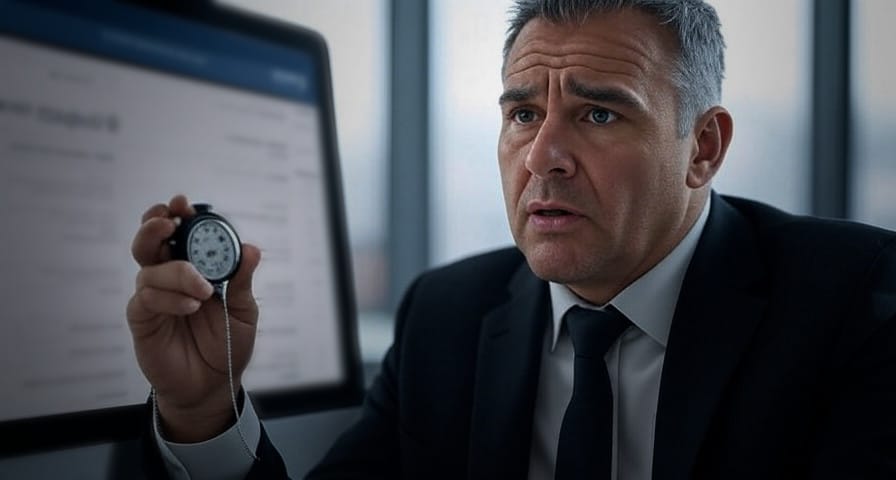Website page load times affect three crucial statistics that help or hinder your website’s ability to shine. The three data points affected are your site’s...
Slow page load times negatively impact the user’s experience of your website. When a page loads slower than expected, many people simply abandon your site and move on. That leads to high bounce rates and deprives you of the opportunity to secure a sale or new lead.
Many site owners turn to fancy optimisation plugins in the hopes they will speed up WordPress...
You can find several such plugins in the sidebar to the right of this article, or below it if you’re using a mobile device.
Unfortunately, WordPress site owners are often disappointed by the results. On average, optimisation plugins yield a 1.4-second improvement in page load times, which tends to be one-quarter of the improvement required. Here’s why...

When optimisation plugins fail to speed up WordPress, it’s not necessarily because the plugins aren’t working. It’s almost always because the real problem is inadequate server resources provided by the current web hosting package.
It’s easy to see how this happens...
A new WordPress site is launched with a couple of plugins, a few pages, and some modest images.
The site isn’t getting many visitors, search engines are crawling the site regularly, and the world’s criminals haven’t yet discovered the site.
Thus, on day one, the web hosting is perfectly adequate.
But times change, and we must change with them.
Over time, more people discover the site. Many of these people return, further boosting the number of requests for text, images, video, and other resources.
Search engines visit the site too, crawling every single page, and further consuming resources.
Then the criminal community turns up, hoping to break into an administrator account and repurpose the server’s resources for their own ends.
New plugins were installed, too. Perhaps many new plugins. Maybe some of them weren’t written very well, or haven’t been updated for years and thus aren’t making use of PHP’s speed advances.
All these factors combine in a perfect storm that has a web server struggle to keep up with the demands placed on it.
If your site’s page load times are slow, there’s a very good chance the main problem is one of inadequate server resources. When that’s the case, implementing an optimisation plugin won’t help to speed up WordPress.
There are other factors at play, also...
A web server is a computer and has finite resources. If your site is getting slower over time, there’s a pretty good chance the site’s hosting resources are no longer adequate.
Do you have a WordPress site? Are you concerned about its performance? The One Stop Web Shop has considerable experience and expertise in helping business owners speed up WordPress.
In particular, we can help diagnose the actual problem and focus on fixing that.
If web hosting is the problem, that’s where we’ll start. We work with three different providers that have solutions that suit any hosting requirement.
If the problem lies elsewhere, such as a server hijacked by cybercriminals, loads of unnecessary plugins, unoptimised images, the need for object caching, conflicts between plugins...
Whatever the problem is, we’ll find it and we’ll fix it. When you need to speed up WordPress, The One Stop Web Shop is who you want in your corner.
The initial consultation is free, so fill out this form and click the button now...

There are plenty of ways to speed up WordPress in this article, but as always, The One Stop Web Shop likes to overdeliver. Here are more ways you can try to improve the load times of your WordPress website...
Before you start installing plugins and investing in image optimisation, you should make sure your WordPress site isn’t already building pages in less than three seconds.
Website Grader assesses the speed of your page and gives you a pass or fail in a number of different areas. This will help focus your efforts on the areas most likely to bear fruit.
Most web hosting companies now provide the ability to upgrade the PHP version your site runs with the click of a button. If you’re using an old version of PHP, upgrade now.
In particular, PHP 8.4 is 4.1 times faster than PHP 5.6! Even upgrading from PHP 7 to 8 helps to speed up WordPress.
Newer versions of MySQL are faster than older versions. If yours hasn’t been updated for years, an upgrade may add a spring to your WordPress site’s page loads.
You should also consider installing an object cache that picks up where page caches leave off, and reduce the load on your database by caching the results of queries.
Getting a large WordPress site to perform is a complex task with a dizzying array of potential optimisations, issues, and challenges.
When you need to speed up WordPress and you’re in a hurry, get a professional to do it for you. You’ll get a faster site and you’ll get it sooner. Click here now.

Test your website’s page load speed (it’s free) and see whether you need to speed up WordPress.
Alternatively, get the professionals to diagnose and speed up WordPress for you. Click here now.


Copyright © 2026 TheOneStopWeb.Shop. All rights reserved.